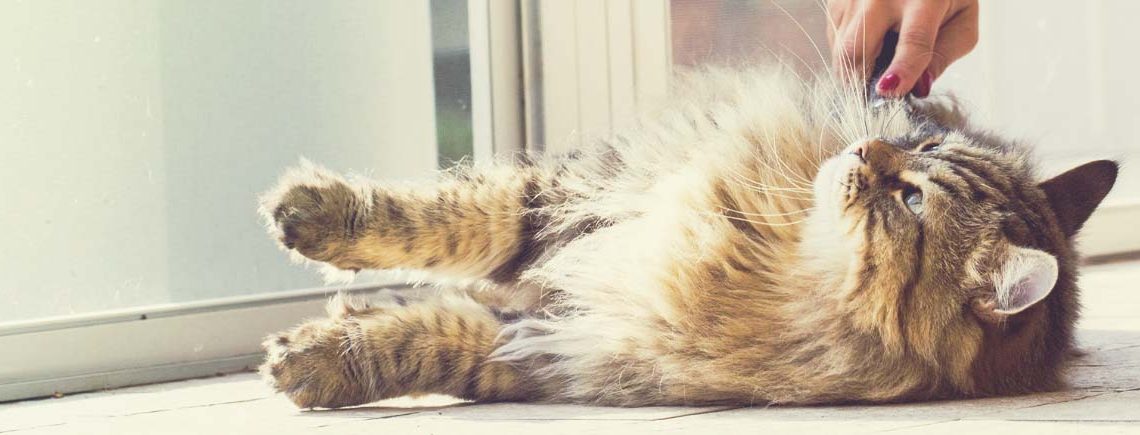Why Does My Cat Get Hairballs?
Cats often have the tendency to leave unwanted gifts around the house, with hairballs being one of them. As your cat groom and cleans himself, it can often lead to accidentally swallowing a lot of hair, which can formulate into balls in his stomach. It is not uncommon for cats to get hairballs from time to time, but many hairballs in a short period of time can cause concern. If you are wondering what is causing them or what the symptoms are, I have put together a helpful guide on how you can help your cat deal with this hairy problem.

Carol Doyle, BSc VN DVM
Carol DoyIe is a small pet veterinarian in a practice in Ashbourne, Co. Meath and is the human companion to her cats, Nala and Donal, two horses - Indie and Bella, and her dog Phoebe.
As a guest blogger and advisor, Carol shares her professional advice with pet owners, answering many of the questions that she gets asked regularly in-clinic.
What are Hairballs?
When your cat grooms himself, tiny hook-like structures on their tongue catch loose and dead hair, which is then swallowed and inadvertently indigested. Most hairs easily pass through the stomach and intestines, but sometimes they can build up and form an obstructing mass. Usually, your cat will vomit the hairball to get rid of it. It’s not uncommon for a cat to vomit a hairball every month or so, with long-haired cats or those that groom excessively having hairballs more often. However, regular hairballs, and certainly daily hairballs, may be a sign of an underlying problem.
Symptoms of Hairballs in Cats
If you notice any of the following symptoms, I recommend contacting your veterinarian, as they could indicate that a hairball may have caused a potentially life-threatening blockage:
- Continuous vomiting, gagging and retching but not producing a hairball
- Lack of appetite
- Lack of energy
- Constipation or diarrhoea

Helping a Cat with Hairballs
If your cat is struggling to pass a hairball, there are many treatments available to help with this. BEAPHAR Hairball Easy Treat 35g are delicious, easy-to-administer treats filled with a specially formulated paste for cats prone to hairballs. The treats contain an oil-rich malt paste to lubricate the stomach and aid the natural passage of ingested hair through your cat’s intestines.
VetIQ Healthy Bites Hairball Remedy for Cats 65g helps to assist passage of swallowed fur through the gut to avoid the formation of hairballs. Healthy Bites Hairball Remedy have been formulated by animal nutritionists and are approved by veterinarians, they have no artificial colours, flavours or preservatives and are wheat free.
Plenty of exercise can also help your cat pass a hairball. Cats tend to go to the toilet more regularly when they get enough exercise. Encourage your cat to move more by regularly playing with him; Chase toys are a great way to keep him entertained. Pouncing, grabbing onto, or simply swiping at the toy with their paws is an effective way to keep your cat active..
If your cat has been coughing up many hairballs or is struggling to cough them up, I suggest a visit to the vets so they can provide advice on the best way forward.

Preventing Hairballs in Cats
If your cat is prone to hairballs, try out the following to help prevent them developing further. Always seek veterinary advice and discuss your cat’s individualised care.
- Brush your cat regularly. This helps remove loose hairs and is especially helpful for long haired cats. Grooming your cat everyday can not only help minimise hairballs that will end up in their stomach, but is also a fun way to bind with your kitty.
- Specialised ‘hairball’ food contain a high-fibre formula and are designed to improve the health of your cat’s coat, reduce the amount of shedding, and encourage hairballs in cats to pass through the digestive system. Foods such as HILLS Hairball Indoor Adult dry cat food is specially formulated with advanced fibre technology to reduce hairballs in adult cats living indoors. Before switching foods, always consult with your veterinarian first.
- Discourage excessive grooming. If your cat is compulsively grooming themselves and you suspect this may be the cause of their hairballs, try to train your cat to do another enjoyable activity instead of constantly licking their coat, such as playing with their toys or scratchers by themselves.

